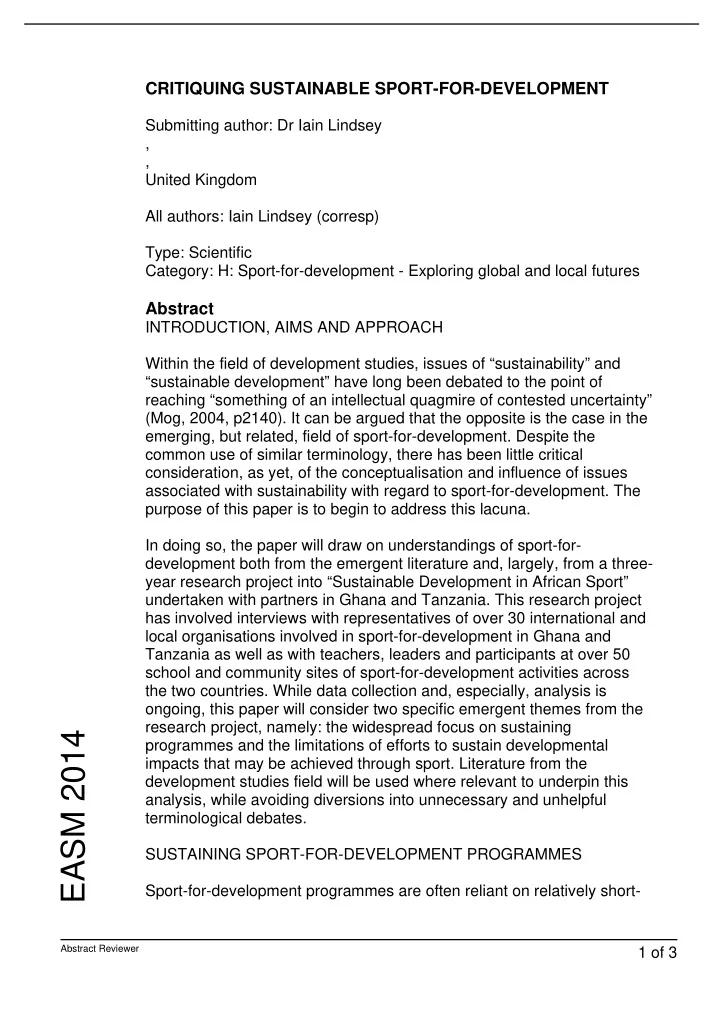

CRITIQUING SUSTAINABLE SPORT-FOR-DEVELOPMENT Submitting author: Dr Iain Lindsey , , United Kingdom All authors: Iain Lindsey (corresp) Type: Scientific Category: H: Sport-for-development - Exploring global and local futures Abstract INTRODUCTION, AIMS AND APPROACH� � Within the field of development studies, issues of “sustainability” and “sustainable development” have long been debated to the point of reaching “something of an intellectual quagmire of contested uncertainty” (Mog, 2004, p2140). It can be argued that the opposite is the case in the emerging, but related, field of sport-for-development. Despite the common use of similar terminology, there has been little critical consideration, as yet, of the conceptualisation and influence of issues associated with sustainability with regard to sport-for-development. The purpose of this paper is to begin to address this lacuna.� � In doing so, the paper will draw on understandings of sport-for- development both from the emergent literature and, largely, from a three- year research project into “Sustainable Development in African Sport” undertaken with partners in Ghana and Tanzania. This research project has involved interviews with representatives of over 30 international and local organisations involved in sport-for-development in Ghana and Tanzania as well as with teachers, leaders and participants at over 50 school and community sites of sport-for-development activities across the two countries. While data collection and, especially, analysis is ongoing, this paper will consider two specific emergent themes from the research project, namely: the widespread focus on sustaining EASM 2014 programmes and the limitations of efforts to sustain developmental impacts that may be achieved through sport. Literature from the development studies field will be used where relevant to underpin this analysis, while avoiding diversions into unnecessary and unhelpful terminological debates.� � SUSTAINING SPORT-FOR-DEVELOPMENT PROGRAMMES� � Sport-for-development programmes are often reliant on relatively short- Abstract Reviewer 1 of 3
term funding, sometimes from international donors. As a result, the data suggests that sustaining the delivery of existing sport-for-development programmes is the key priority for many organisations in the field. Two approaches to sustaining programmes predominate: sourcing further funding and developing human, and commonly voluntary, capacity to continue programme delivery. With regards to both approaches, responsibility for maintaining such financial and human resources beyond the initial lifespan of programmes is largely placed on in-country organisations, which tallies with an implicit rationale of avoiding external dependency. In common with development studies literature (e.g. DeLange, 2013), sport-for-development practitioners recognise the significant challenges and fragility of attempts to sustain programmes in such ways with the likelihood that programs may well dissipate either in the immediate- or longer-term. Other significant issues with the focus on sustaining programmes can be identified as well. First, programmes funded initially by international donors can be typified by a level of trusteeship and reliance on external technical expertise that may inhibit sustainability (Ziai, 2013). Second, there is a common recognition of the importance of evidence in garnering resources to sustain programmes. In common with recent debates in the sport-for-development literature (Coalter, 2013), the implicit assumption is that evidence of impact will necessarily be positive and supportive. An associated consequence may be that there is little consideration of whether and what aspects of programmes would be valuable to sustain. � � SUSTAINING DEVELOPMENT THROUGH SPORT� � Perhaps most importantly, the evident focus on sustaining programmes prioritises the potential means rather than the desired ends of sport-for- development. Achieving positive and sustainable change, whether that be for individuals, communities or on a more widespread basis, is recognised in the literature to be a long-term, complex, contested, unpredictable and non-linear process (DeLange, 2013). The development studies literature recognises a number of facets required to sustain positive change, which appear only to be addressed in isolated cases within the sport-for-development field, if at all. The paper will question the extent to which holistic approaches, which facilitate integrated change at different levels from the local to national (Aikman, EASM 2014 2010), are widespread within the sport-for-development field. Instead, sport-for-development work is often fragmented and reliant on single organisations, with approaches to building widespread, long-term in- country partnerships at different levels being somewhat exceptional. Similarly, there remain substantial debates as to the extent to which desired ends are locally determined in sport-for-development as well as whether current approaches involve the variety of forms of capital required to achieve such ends on a sustainable basis. The paper will conclude by considering the potential implications of these critiques for future sport-for-development policy, practice and research. Abstract Reviewer 2 of 3
References Aikman, S. (2010): Marching to different rhythms: international NGO collaboration with the state in Tanzania, Development in Practice, 20(4- 5), 498-510.� � Coalter, F. (2013) Sport for development: What game are we playing? Abingdon: Routledge. � � de Lange, P. (2013): Evaluation of Dutch support to capacity development, Development in Practice, 23(1), 33-45� � Mog, J. M. (2004). Struggling with sustainability—a comparative framework for evaluating sustainable development programs. World Development, 32(12), 2139-2160.� � Ziai, A. (2013). The discourse of “development” and why the concept should be abandoned. Development in Practice, 23(1), 123-136. EASM 2014 Abstract Reviewer 3 of 3
Recommend
More recommend